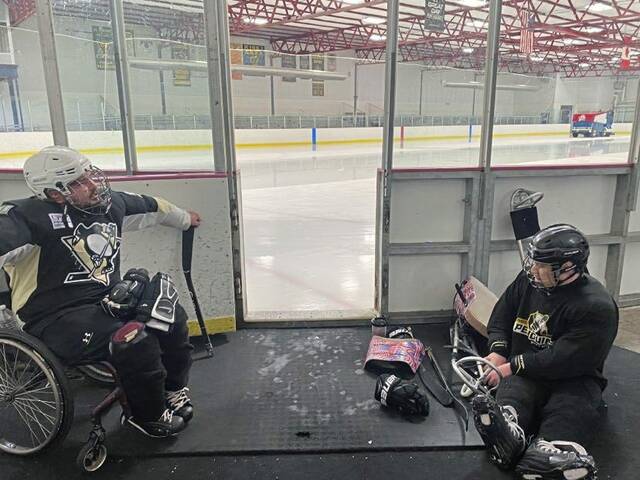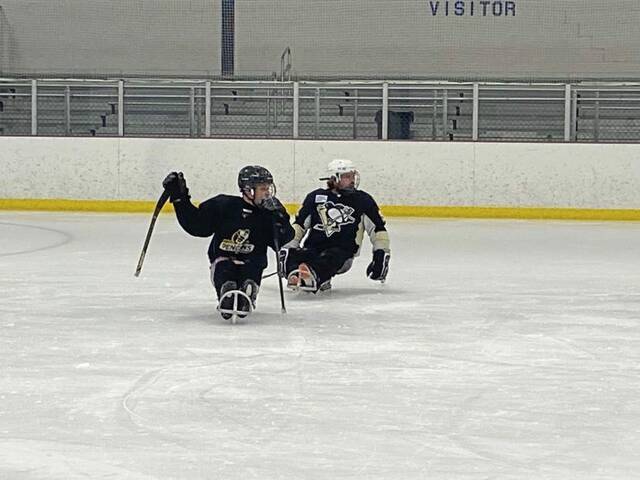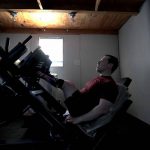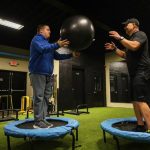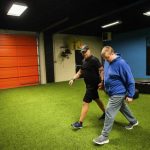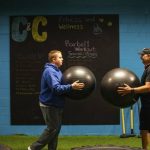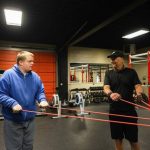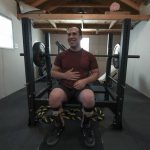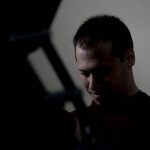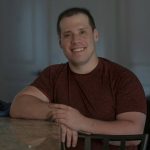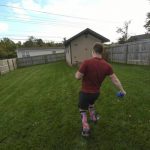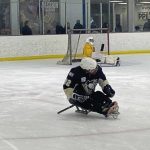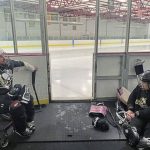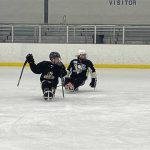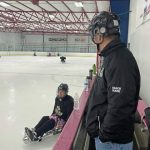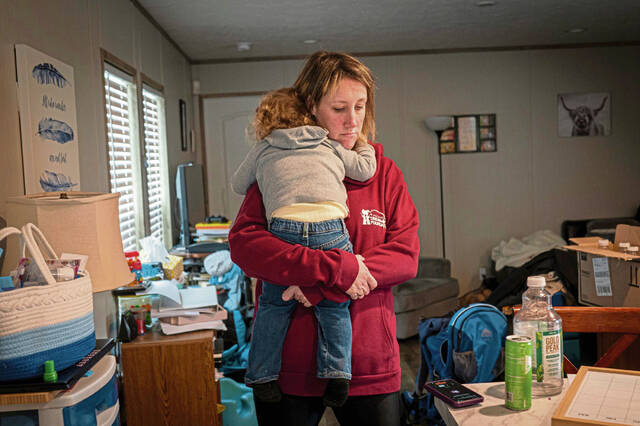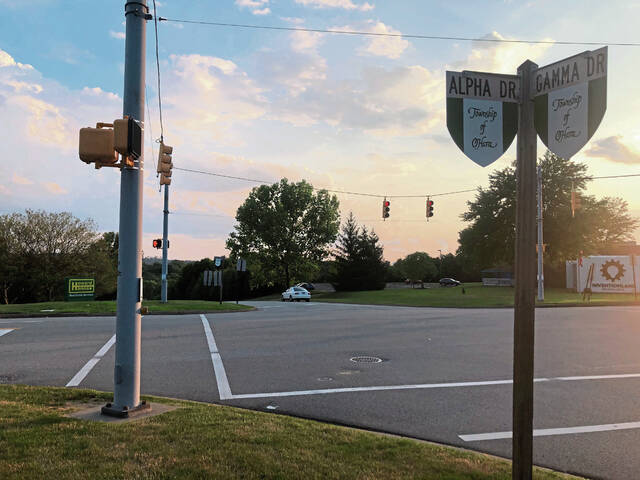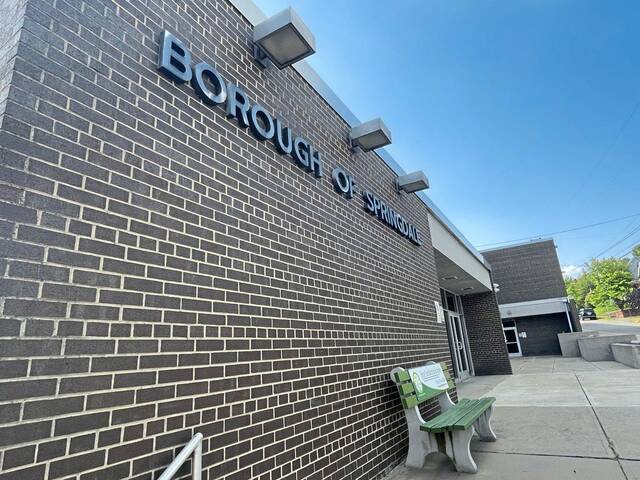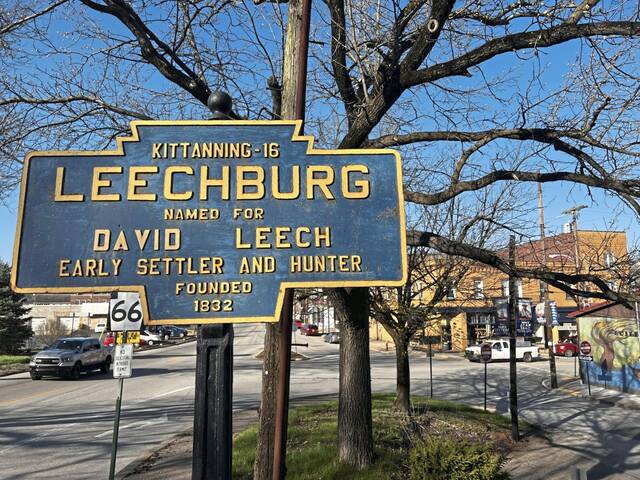At first sight, wheelchairs, crutches and leg braces might not be associated with exercising.
But seeing what the people who use those devices can do might change one’s perspective.
They lift weights, skate on sleds and shoot a hockey puck 60 mph. They pound tires with a sledgehammer and drive themselves to and from practices and the gym.
They do pull-ups and leg presses.
And they show others — those with disabilities and those without — how to work out.
Just like people, personal trainers come from all skill levels. There are able-bodied trainers working with those with disabilities and those with disabilities working with those who are able-bodied. The one constant is a personal trainer who tailors a workout to utilize the person’s individual skill level and help create a specific path to attain a personal fitness goal.
“When someone first comes to me, I share my experience because I have to show them that I can do it, even though when they look at me they might think I can’t,” said Dan McCoy, 27, of East Deer, a member of the 2014 U.S. Paralympic team that won the gold medal in Sochi, Russia. “Just because I might not be able to do something, doesn’t mean I can’t teach someone else how to do it and to do it safely.”
Overcoming obstacles
McCoy was born with spina bifida, a birth defect that occurs when the spine and spinal cord don’t form properly, and hydrocephalus, the buildup of fluid in the brain.
He has had more than 20 surgeries.
“As a kid, I would play games in the hospital and shoot paint syringes,” said McCoy, who hates needles. “Everyone has some disability. Some you can see, others you can’t. For me, I don’t focus on my disability.”
On a Thursday afternoon, he was doing pull-ups in his living room. He is a member of the Pittsburgh Mighty Penguins, described as a sled hockey organization that “operates therapeutic and competitive ice hockey programs for the benefit of physically disabled individuals in Pennsylvania and adjacent areas.”
“I’ve watched him do pull-ups still strapped to his wheelchair,” said Dr. Shaun Darrah, an assistant professor at the University of Pittsburgh School of Medicine and medical director of the UPMC Passavant Rehabilitation Institute. “To see Dan on a sled is one of the most magnificent things I have ever seen. He is unbelievable.”
Darrah and other doctors have competed in sled hockey against the Pittsburgh Mighty Penguins. Being on the ice with them demonstrated how skilled they are.
Darrah said McCoy motivates everyone he meets. He shows how to use adaptive equipment so naturally, such as his ability to get from his wheelchair to the ice hockey sled or maneuver from a weight bench to a leg press.
“Autonomy is important,” Darrah said. “We shouldn’t make assumptions that they can’t do things.”
Positives of physical activity
Darrah said there is research that suggests any type of sport or activity can have a positive influence on the quality of life, from the cardiovascular benefits to the social aspect of being around others like you.
A friend of McCoy’s and Pittsburgh Mighty Penguins teammate, Nevin Gray, 25, of Hempfield, has been playing sled hockey since he was 3. His grandfather, Harley Gray of Greensburg, often drives his grandson to practice.
“Athletics is good for everyone,” said Harley Gray, who drove his grandson to the Palmer Imaging Arena in Delmont for a recent practice with the Pittsburgh Mighty Penguins. “I remember the first few times he was on a sled. He would fall over because he had trouble getting his balance. But he continued to get stronger. Look at him now.”
McCoy’s dad, Mark McCoy of Cheswick, is an assistant coach for the Pittsburgh Mighty Penguins.
“All parents want to help their child reach their goals,” Mark McCoy said. “People might think someone with a disability can’t do something, but these players and others like them have shown they can.”
Kaitlyn Rayl, a physical therapy student at the University of Pittsburgh School of Health and Rehabilitation Sciences, said seeing people with disabilities in real-life settings shows you who they are and how they adapt to the world around them to be able to do everyday things.
As the director of Pitt Adaptive Training, she’s watched them play wheelchair rugby and basketball.
“They want to be seen as much of an athlete as any other regular-ability athlete,” Rayl said. “They are competitive and compete at a high level. Their commitment to strength and conditioning is wonderful. They learn what they need to do, and they do it.”
She said continued wellness is important for them to do whatever they set out to do in life. She’s grateful to be able to help them reach their goals and sustain a high quality of life.
Tailoring a workout
With any workout, a trainer will tailor the exercises to fit their clients so they can target certain areas that need work, Darrah said. For someone who uses a wheelchair, maintaining a strong upper body — especially their shoulders — is essential to everything they do.
“They need to focus on building strength there because if they tear a rotator cuff, that might be the difference between them living alone and needed to move in with others so they can get around,” Darrah said. “They can’t risk getting that injury.”
Not all disabilities might be immediately visible.
For someone like Alex Pekar, who has autism, a trainer uses other ways to engage him in a workout. Personal trainer Lou Rocco of Greensburg met Pekar, 22, of Mt. Pleasant at the door of C&C Fitness and Wellness in Youngwood.
He greeted the young man and invited him to choose the music they would work out to. Then they sat and ate an apple before bouncing a big ball and jumping on a mini-trampoline. Proper nutrition is also important when working out, Rocco said.
Rocco, who has competed in triathlons, has worked with people of all athletic abilities. He would customize a workout to the client’s individual needs.
“The individuals with disabilities inspire me the most,” he said. “It’s about attitude, not aptitude. They come to the gym and they work so hard. It’s another level of satisfaction working with the special-needs population.”
Pekar’s mom, Becky Reynolds of Youngwood, said when her son was with Rocco, he was laughing and enjoying the workout.
“Lou was amazing with my son. It was an opportunity for wellness for him. Lou has a special skill to work with someone like my son. It was a wonderful time period with Alex with what Mr. Rocco could do,” she said. “It brings attention to something that individuals like Alex do need.”
Rocco, who moved on to another job, also has worked with Nevin Gray, who is working toward becoming a trainer at C&C Fitness and Wellness.
“When you have a disability, you have to build trust with people,” Nevin Gray said. “They look at your wheelchair and think you can’t teach them how to do something.”
Inspired to train others
Gray said sessions with Rocco helped him understand what his body is able to do, how to strengthen his core and get the most out of a workout. It inspired him to want to train others.
“It’s not about your limitations,” Gray said. “It’s about personalizing a workout and making it fun. I am out to show people that no matter what setbacks life has for you, there’s always a way to make the best of it.”
Dan McCoy said he focuses on his abilities through adaptive sports.
“I live a fairly normal life,” he said. “It’s not always easy. God created me this way. Yes, there have been tough times, but everyone has those. I didn’t plan for my life to be like this. It’s like you never plan for a natural disaster. You never know how you will deal with it until you have to.”
Head coach of the Pittsburgh Mighty Penguins, Ray Harding of Jeannette, said being on the ice for the players isn’t just about exercise.
“It’s about being part of a team and the camaraderie,” Harding said. “They make friends. It’s also a time they forget about doctors and operations and hospitals. They have all been through that. They are all equal out there on the ice.”
Christine Hupkovich of Plum is the executive director of the Pittsburgh Mighty Penguins, which is based in Cranberry.
“They don’t act disabled out on the ice,” said Hupkovich, whose 15-year-old son, Lance, plays on the team. “This is a wonderful community network. They form a bond. It’s fantastic and good for them physically and emotionally.”
Nevin Gray and Dan McCoy have been friends for 22 years.
“There is nothing more inspiring than seeing others like you doing great things, whether it’s on the ice, in the gym or at work,” said Gray, who drives a car with hand controls. “It’s about being independent. People will see me in a gym or store and ask me how I got there, and I tell them, ‘I drove.’ They look at me like they can’t believe that I can drive.”
Dan McCoy said fitness is important for everyone.
“I had a dream I had won a gold medal,” he said. “I saw the gold medal floating in the air. My parents said, ‘Let’s help you get to hold that gold medal and not just dream about it.’ When I train someone, I ask them what their goals are. I share my experience. It’s not about what you learn, but how you learn. I’ve made connections, I know what people are going through. I want to help them. We can all find an exercise or a workout that highlights our abilities, not our disabilities.”












